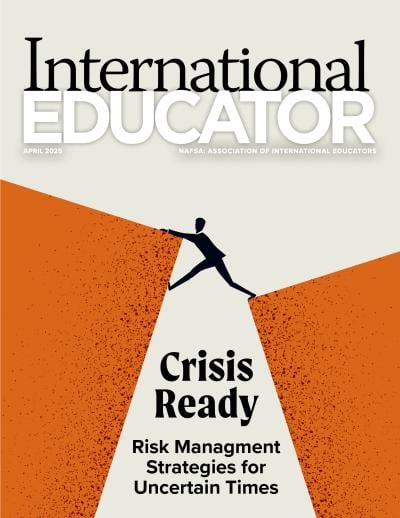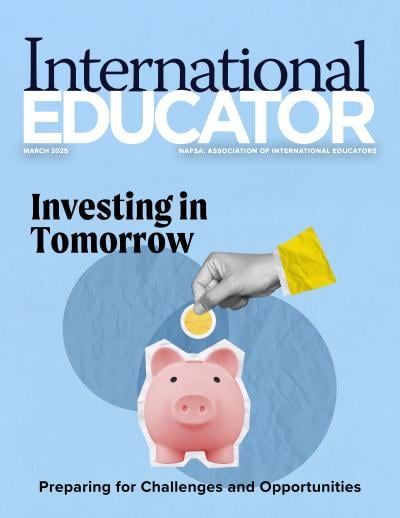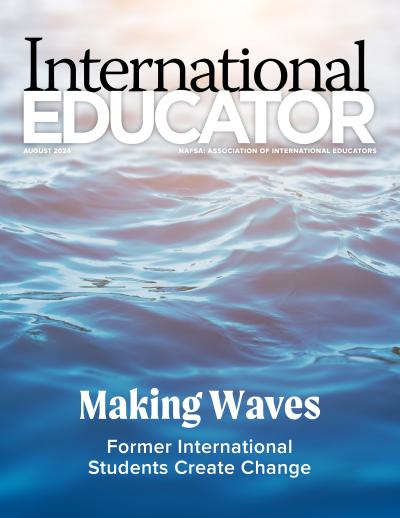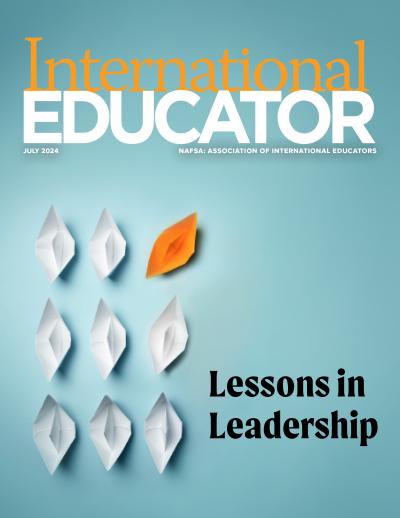International Competence and Career Readiness: Setting Your Students Up for Success

As the workforce becomes more diverse and globalized, employers are looking for graduates who can navigate cultural differences with empathy and emotional intelligence in order to better collaborate, share knowledge, and solve complex problems. Enter intercultural competence—which is generally understood as the ability to interact effectively and appropriately with people from varied cultural backgrounds and adapt one’s behavior based on acquired knowledge and skills.
International education professionals are keenly aware of the importance of intercultural competence in today’s workplace and are exploring different ways that institutions and students can cultivate and articulate this important skill.
Why Employers Value Intercultural Competence
Employers today are looking for graduates who can use their intercultural communication skills to solve problems working from multiple viewpoints and not just a Western perspective, says Kate Hellmann, director of international student and scholar services at Washington State University. “Ten years ago, receiving a bachelor’s degree was enough, but now the crux of the matter is that the knowledge received from that bachelor’s degree does not mean much if you cannot successfully employ your intercultural communication skills working in diverse groups,” Hellmann notes.
Employers often assess intercultural competence through surface-level indicators, such as a candidate's background, the languages they speak, or the countries they have visited, studied, or worked in, says Anjam Chaudhary, global diversity, equity, and inclusion (DEI) program director at Michigan State University. “However, a critical yet less tangible skill is cultural code-switching—the ability to shift between different cultural norms,” she says. “This flexibility is vital, especially when navigating diverse work environments, but it can be difficult for employers to gauge or appreciate, especially for employers who have not experienced the need to code-switch themselves.”
Ten years ago, receiving a bachelor’s degree was enough, but now the crux of the matter is that the knowledge received from that bachelor’s degree does not mean much if you cannot successfully employ your intercultural communication skills working in diverse groups.—Kate Hellmann
How International Educators Can Help
Recognizing the importance of intercultural skills in today's job market, the educators featured in this piece suggest the following strategies for institutions to enhance students' intercultural competence and career readiness:
- Embed intercultural competency as a key learning outcome across disciplines. Courses in fields such as business, health, education, and engineering should explicitly define intercultural learning goals, ensuring students develop skills like cross-cultural communication, global awareness, and cultural empathy.
- Incorporate intercultural elements into cocurricular programs. Leadership development programs, campus clubs, and volunteer opportunities should emphasize teamwork in diverse environments, cultural exchange, and DEI principles.
- Create interdisciplinary courses or modules that examine global issues from various cultural perspectives. Topics such as climate change, public health, or international trade can be taught with a focus on how different cultures approach these challenges.
- Establish interdisciplinary student groups or clubs. Encourage collaboration among students from diverse majors on international research projects, service-learning initiatives, or competitions that address global issues.
- Expand study abroad and student exchange programs. These immersive cultural experiences are among the most effective ways to develop intercultural competence and understanding of others.
- Promote experiential learning opportunities with international organizations. Offer internships and service-learning opportunities in which students can enhance their intercultural understanding and development in a work setting.
- Provide workshops and professional development for faculty. Help educators integrate intercultural competencies into their teaching practices, ensuring that these principles are woven into everyday classroom interactions.
- Embrace opportunities for peer mentorship for students. Consider implementing peer-to-peer programs that integrate cultural competency into career readiness activities and guidance. At Texas State University, cultural competency training is included in a yearlong peer-to-peer mentoring program in which all student mentors participate.
- Host intercultural competency workshops for student leaders and campus organization members. Ensure that campus events focusing on social justice, diversity, and inclusion include practical training on intercultural communication and empathy.
Translating Experience into Insight
Given all that universities and educators are doing to cultivate global competencies, many students have a wealth of intercultural experiences to draw on as they begin their careers. However, it can be challenging for students to recognize the value of their experiences and effectively translate them into real-world applications. International educators can support students by providing opportunities for reflection and coaching, helping them articulate their strengths to potential employers.
For instance, Washington State University hosts workshops “to help students understand and articulate the intercultural communication skills they’ve gained from their curricular and cocurricular experiences so they can talk about them effectively in a résumé, [curriculum] vitae, and in an interview,” says Hellmann.
Darla Deardorff, UNESCO chair on intercultural competence at Stellenbosch University and founding president of the World Council on Intercultural and Global Competence, emphasizes the importance of reflection “not just on what you learned, but also on the ‘so what’— why was that learning important—and the ‘now what’—what will and can you do as a result of that learning? And also reflecting on how you changed; in other words, what changes occurred not just in your knowledge but also in your skills and attitudes as a result of your intercultural experience and how you plan to continue growing and learning,” she says.
Experts agree that students should focus on sharing real-life examples of working with diverse communities, discussing instances where students adapted their perspectives, and highlighting experiences of navigating cultural differences. Daniel Ponce-Taylor, sustainability and strategic partnerships director at the Intercultural Outreach Initiative, recommends students use the STAR (situation, task, action, result) method to present experiences in job interviews and on résumés. “It helps students explain the impact of their actions, making their skills concrete and relatable to employers,” he says.
Whether it’s perspective taking, empathy, open-mindedness, listening for understanding, cultural humility, problem-solving, critical thinking, and more—these are skills that are useful in any context. —Darla Deardorff
Ailsa Lamont, cofounder and CEO of the International Education Sustainability Group and the Climate Action Network for International Educators (CANIE), counsels students to talk about how their international experience gives them the ability to adapt to almost any situation and to talk to anyone comfortably. “There aren’t many roles where effective communication doesn’t come in handy,” she says. “In an interview, I’d suggest raising the topic if it doesn’t come up naturally, perhaps even by asking whether the job would offer the opportunity to practice those skills.”
Similarly, Deardorff suggests framing intercultural competence in terms of transversal skills—“Whether it’s perspective taking, empathy, open-mindedness, listening for understanding, cultural humility, problem-solving, critical thinking, and more—these are skills that are useful in any context.”
And while study abroad is certainly a primary channel for intercultural learning, it’s not the only one, says Chaudhary, stating that it can happen on campus through everyday interactions. “We also encourage participation in collaborative online international learning, along with community and civic engagement programs, to further develop intercultural awareness,” she says. “Highlighting these examples signals to employers that the candidate can help create a workplace that thrives on intercultural collaboration and understanding.”
Highlighting Commonality, Not Difference
With intercultural competence remaining a highly desired skill in business settings, international educators and students both play important roles in connecting the dots between intercultural experiences and career readiness.
And it’s important to note that intercultural competence is not always about difference, says Deardorff. “This doesn’t mean to ignore difference, but I think at times, we’ve focused on difference to the exclusion of our shared humanity,” she says. “Given all that divides us, it becomes imperative that we increasingly engage in listening for understanding (instead of response), that we seek first to understand, and that we embrace the common values and common ground we all share.” •
NAFSA Resources
- Intercultural Communication Toolkit 2.0
- Curriculum Internationalization and Intercultural Training Network
- “Driving Change in Professionalization within International Education.” Trends & Insights, July/August 2024.
- Developing Proficiency in Intercultural Communication e-Learning series
- International Education Professional Certificate (IEPC)
- Internships, Service Learning, and Research Abroad
- Making Global Learning Universal
- Navigating the Intercultural Classroom
- Learning Across Cultures
About International Educator
International Educator is NAFSA’s flagship publication and has been published continually since 1990. As a record of the association and the field of international education, IE includes articles on a variety of topics, trends, and issues facing NAFSA members and their work.
From in-depth features to interviews with thought leaders and columns tailored to NAFSA’s knowledge communities, IE provides must-read context and analysis to those working around the globe to advance international education and exchange.
About NAFSA
NAFSA: Association of International Educators is the world's largest nonprofit association dedicated to international education and exchange. NAFSA serves the needs of more than 10,000 members and international educators worldwide at more than 3,500 institutions, in over 150 countries.
NAFSA membership provides you with unmatched access to best-in-class programs, critical updates, and resources to professionalize your practice. Members gain unrivaled opportunities to partner with experienced international education leaders.














